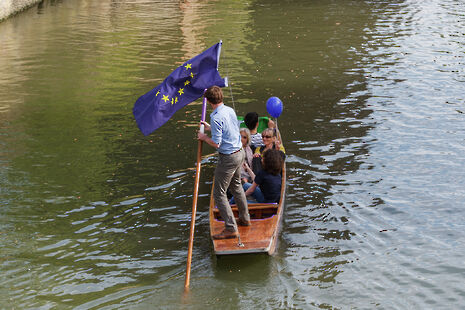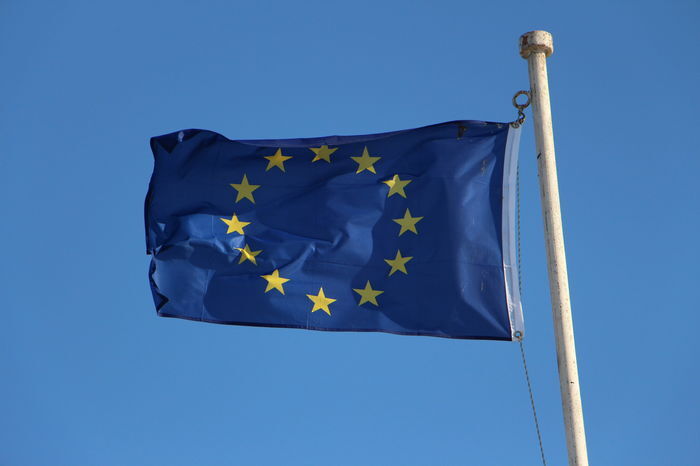Two-party politics has betrayed students. We must send a message in the European elections.
Luke Hallam argues that those who do not wish to leave the European Union must not only vote in the European elections, but look beyond the two main parties when casting their vote

What are the problems facing Britain at the moment? A damning Human Rights Watch report released this week warned that the UK government “is violating the rights of people in the UK who are going hungry.” The research, much of which was conducted in Cambridgeshire, implicates the government’s punitive welfare policies, especially the catastrophic roll-out of Universal Credit. Meanwhile, the climate crisis looms large, a fact of which we will be reminded on Friday when schoolchildren are expected to march through King’s Parade on another ‘climate strike.’
But all of this is being obscured by a dark cloud of nationalism. Recent weeks have seen an extraordinary re-alignment in the public’s voting intentions – Labour and the Conservatives are haemorrhaging votes to both Nigel Farage’s Brexit Party and parties campaigning to stop Brexit, especially the Liberal Democrats. Both sides are being radicalised; young people need to work out where they stand, or risk sitting quiet during a time of national crisis.
Young people need to work out where they stand, or risk sitting quiet during a time of national crisis
The European Parliament elections taking place tomorrow on Thursday 23rd might be the last chance we’ll ever get to elect MEPs. This is a historic occasion, and if we’re going to leave the European Union we can at least send a single, powerful message that the United Kingdom deserves better. Theresa May is widely expected to step down this summer, and it is now a probability that Boris Johnson will be prime minister by Christmas. With Boris in Number 10 and the UK out of Europe, we must stop and consider whether this is the Britain we want to live in. The stakes are high, and we cannot allow the EU question to become, in the words of Labour MP David Lammy, “fudged and hedged”. Yet Lammy angrily admitted that this is exactly what his party has been doing. Corbyn’s lacklustre campaigning in the 2016 referendum has been compounded by his refusal to follow the wishes of most of Labour’s membership and support a People’s Vote, or to make the principled case against Brexit. Quite simply, the mainstream parties do not represent the values of most students when it comes to Europe.
This is why young people must vote to send a message on Thursday. After three years, we should still be making an argument from first principles for staying in the EU. The climate crisis, for example, can only be addressed through international cooperation. The EU has been hugely significant in making sure the UK gets its act together, as a Cambridge academic testified in a report by the Green Alliance: “I have no doubt that the UK would have backed down from [its] renewables commitment if it hadn’t been for [a] European directive.”
Milkshaking is not the answer; vocal and unequivocal campaigning is
Nationalists and climate-deniers cannot be tackled by looking inwards, nor by failing to clearly lay out your stall during a time of national crisis. I joined the Liberal Democrats and ran to be Chair of Cambridge University Liberal Association in no small part because of the unambiguous position we hold on Europe. Our “Bollocks to Brexit” campaign may be coarse, but it presents a clear platform in favour of an internationalist, humanitarian, green Britain in a forward-looking Europe. Out of the other anti-Brexit parties, ChangeUK is flatlining at 4% in the polls, and has been beset by media gaffs. The Greens have done well recently, but are still stuck in single figures. The European elections take place using the D’Hondt system, which, although it is nominally proportionally, gives huge rewards to parties with large voting blocs, especially in regions such as the East of England (where Cambridge is located) with 8 or fewer seats available.
Progressive young people must coalesce and present a united voice in opposition to Brexit. We have to stand in solidarity with fellow students and staff, which means not being shy to shout about the fact that the EU is instrumental in setting a minimum standard for workers’ rights, in funding our University’s departments, as well as schemes such as Erasmus+. Milkshaking is not the answer; vocal and unequivocal campaigning is.
While over 50% of managers and retirees voted in the last European elections in 2014, only 37% of students did. These elections, therefore, represent one last chance to end the apathy with regard to voting in European elections. If you take a certain view of Britain’s past, we’re living through the third crisis-wave in modern history: WW2 birthed the welfare state; the crisis of the late 1970s ended in Thatcherism; and the 2008 Recession seems to have led to nationalism and identity politics. The first step for pro-Europeans is to vote tomorrow, and to vote in line with what we believe in. We owe the two main parties nothing until they start representing us.
 News / Hundreds of Cambridge academics demand vote on fate of vet course20 February 2026
News / Hundreds of Cambridge academics demand vote on fate of vet course20 February 2026 News / University Council rescinds University Centre membership20 February 2026
News / University Council rescinds University Centre membership20 February 2026 News / Judge Business School advisor resigns over Epstein and Andrew links18 February 2026
News / Judge Business School advisor resigns over Epstein and Andrew links18 February 2026 News / Petition demands University reverse decision on vegan menu20 February 2026
News / Petition demands University reverse decision on vegan menu20 February 2026 News / Caius students fail to pass Pride flag proposal20 February 2026
News / Caius students fail to pass Pride flag proposal20 February 2026










